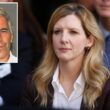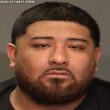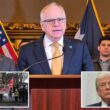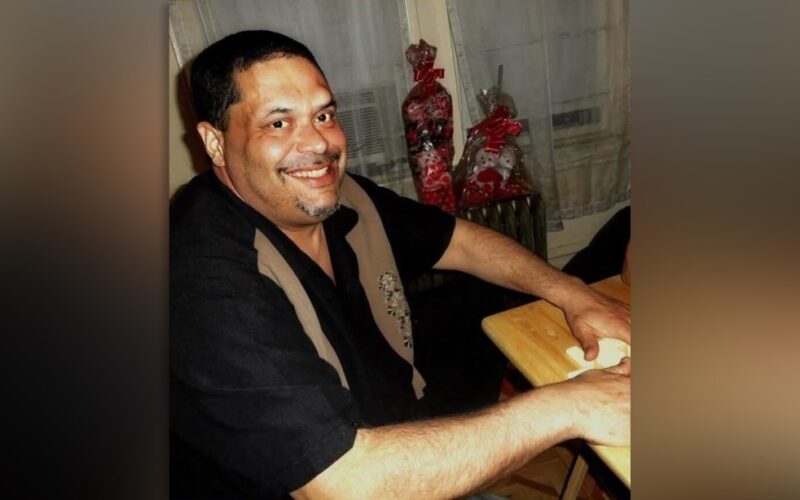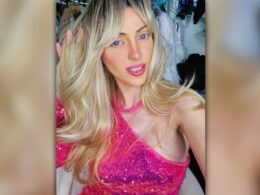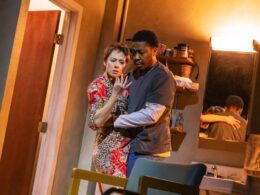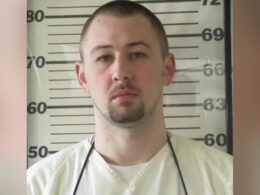A home-grown hero who spent 92 days working at Ground Zero in the aftermath of 9/11 died in a crash on a Bronx bridge just months after winning a prestigious national award for his substance abuse counseling.
Anthony Kohl, 59, an Army veteran and master plumber who overcame his own substance abuse issues to become a mentor to others, was killed last month on City Island Bridge when the moped he was riding home from work struck an SUV.
“We knew he was getting an award, but we really didn’t know the scale of it,” Kohl’s son Mark Kohl said about watching his father receive the national Peer Specialist of the Year award from the National Council for Mental Wellbeing at a convention in Philadelphia in May.
“I couldn’t have been more proud of him. I can’t put the words into how proud we were to see that.”
As a peer specialist, Kohl used his own history with substance abuse to help people currently dealing with addiction and to connect them to resources.
“Anthony was one of the most unselfish persons I encountered,” said Debbian Fletcher-Blake, president and CEO of VIP Community Services, where Anthony worked. “He motivated everyone — staff, trainees, visitors, partners and clients. His presence was larger than life.”
Kohl lived on City Island just a few blocks from the bridge, where he crossed over the median and collided with a 2025 Nissan Murano headed in the opposite direction at about 3:35 p.m. Sept. 3, according to cops.
The 38-year-old driver remained at the scene and has not been charged. He was not hurt in the crash.
Medics rushed Kohl to Jacobi Medical Center, where he died.
Kohl was a star football player as a defensive lineman at George Washington High School in Washington Heights, where he was raised. But at home, life was a struggle.
“We all had a rough life,” said Kohl’s sister Alyssa Kohl. “Our mother died early. Growing up in Washington Heights, there was a lot of things going on during that time. I wasn’t being well taken care of at the time. And he just took it upon himself to take care of me.”
Upon graduating from high school, Kohl immediately enlisted in the Army. When he got out at age 20, he got guardianship over Alyssa, who was 10.
“He took me, and he got us a better place to live, got me in school, helped me manage my diabetes,” said Alyssa, who has Type 1 diabetes. “He took me to doctors appointments. You know, stepped up as a brother, and just looked after me and was good to me.”
To support his family, Kohl became a master plumber. He got married and had his first son, Mark, in 1991. A second son followed shortly after.
“My dad was my football coach, basketball coach, baseball coach. I mean, if it was a sport that I played, he coached, whether he knew the sport or not,” Mark said. “He was the greatest man I ever met.”
Alyssa lived with the family until she graduated high school and went off to college.
Courtesy of Family
Anthony Kohl (center, pictured with his sons) received the national Peer Specialist of the Year award from the National Council for Mental Wellbeing in May. (Courtesy of Family)
The family moved to Pennsylvania, but Kohl still commuted to New York City for work. On Sept. 11, 2001, he was in Manhattan for a plumbing job when the first plane crashed into the North Tower.
After the disaster, like scores of other building trades workers, he volunteered, working the Pile at Ground Zero for 92 days, offering his services as a master plumber, his family said.
In an interview with the National Council for Mental Wellbeing published in April Kohl recalled his first brushes with substance abuse as a teenager.
“My early life was marked by drug use — crack cocaine and alcohol from a young age,” he said in the interview. “I had uncles who used heroin.”
With Alyssa and two young sons to look after, Kohl managed to keep things in check. But when his sons got older, around the time they graduated high school and left for college, and with Alyssa thriving on her own, Kohl began to spiral. His grandparents, whom he had been extremely close to, died in quick succession.
By this point in his life, about 10 years after he had volunteered at Ground Zero, Anthony and his family had moved to Florida.
“Florida was bad. Florida was the worst,” Alyssa said. “He was running the streets, getting high, getting drunk.”
Kohl was arrested in Florida for cocaine possession, records show. Alyssa remembers him calling her from jail, asking her to send him money.
“I was his younger sister, and I would never say no to him,” she said. “That time was really hard.”
Although his life was falling apart, Kohl worked hard to shield his children from the worst of it. “There are things I won’t talk about, because I want the boys to know him only as the amazing father and best guy that he was,” Alyssa said.
After getting out of jail in Florida, serving less than a year, Kohl decided he needed a change and went to stay with Alyssa in New York. He attended an outpatient treatment program. In 2014, he started a peer-counseling internship, going on to earn his certifications and throwing himself into his work as a peer counselor.

Courtesy of family
In May, Anthony Kohl (center, with his sons) received the national Peer Specialist of the Year award from the National Council for Mental Wellbeing at a convention in Philadelphia. (Courtesy of family)
“I found myself listening to people’s stories, offering guidance and pointing them toward resources that helped me,” Kohl said in the National Council for Mental Wellbeing interview. “That kind of support came naturally, and it felt good to play even a small part in someone else’s healing.”
In addition to his day job as a peer specialist at VIP Community Services, Kohl worked nights at Bronx HOPE, a program that focuses on overdose prevention and connecting people to services after an arrest.
“The first precinct I was assigned to turned out to be the same one where I had been arrested years before,” Kohl said in the pre-award interview. “I remember sitting there, waiting, and I just started laughing. The officer asked if I was OK, and I said, ‘Yeah — I’m good.’ Because, for the first time, I was leaving that building without handcuffs. I used to spend the night there, eating bologna sandwiches and waiting to see a judge. Now, I was there to help someone else. That full-circle moment hit me hard. It reminded me how far I’d come.”
Originally Published:
